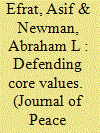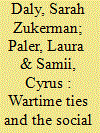|
|
|
Sort Order |
|
|
|
Items / Page
|
|
|
|
|
|
|
| Srl | Item |
| 1 |
ID:
173211


|
|
|
|
|
| Summary/Abstract |
A bargaining framework and a measure of conflict polarization are developed from two elements: (i) hatred-based negative externalities experienced by the parties to the conflict, and (ii) penalties the parties impose on their delegated negotiators when concessions are made in the bargaining process. The framework establishes agreement and disagreement regions and it is shown that a necessary condition for a negotiated solution is the adoption of a dual policy that combines dissociative political and military strategies. This analytical approach is applied first to polarized conflicts generally and then to the specific case of the internal conflict in Colombia between that country’s government and the FARC guerrilla group. The model provides a rationale for the complex dynamic of Colombia’s current peace process, which has involved a preliminary agreement and its subsequent rejection in a national referendum. Our analysis highlights the successful dissociative political-military strategy followed by the negotiators that enabled them to reach the agreement and the negotiators’ underestimation of the hatred levels that led the majority of the Colombian society represented in the referendum to vote the agreement down because they considered the concessions made by the government too generous to be acceptable.
|
|
|
|
|
|
|
|
|
|
|
|
|
|
|
|
| 2 |
ID:
173213


|
|
|
|
|
| Summary/Abstract |
Are states willing to overlook human rights violations to reap the fruits of international cooperation? Existing research suggests that this is often the case: security, diplomatic, or commercial gains may trump human rights abuse by partners. We argue, however, that criminal-justice cooperation might be obstructed when it undermines core values of individual freedoms and human rights, since the breach of these values exposes the cooperating state to domestic political resistance and backlash. To test our argument, we examine extradition: a critical tool for enforcing criminal laws across borders, but one that potentially threatens the rights of surrendered persons, who could face physical abuse, unfair trial, or excessive punishment by the foreign legal system. We find support for our theoretical expectation through statistical analysis of the surrender of fugitives within the European Union as well as surrenders to the United States: greater respect for human rights correlates with the surrender of fewer persons. A case study of Britain confirms that human rights concerns may affect the willingness to extradite. Our findings have important implications for debates on the relationship between human rights and foreign policy as well as the fight against transnational crime.
|
|
|
|
|
|
|
|
|
|
|
|
|
|
|
|
| 3 |
ID:
173208


|
|
|
|
|
| Summary/Abstract |
Scholars of political violence often face problems concerning data availability. Research on the perpetrators of that violence is no exception. Over the past 40 years we have made great strides in understanding who joins in violent action and why, yet have rarely probed the representative nature of the subjects queried or contemplated the implications of this sampling for our conclusions. It is generally assumed that those left to ‘tell the tale’ about what transpired are representative of those who participated in the violence. In this article, we use the context of the 1994 genocide in Rwanda to probe questions about which perpetrators of violence we include in our research and subsequently, who we miss. We theorize an often overlooked group of perpetrators, the ‘murderers in the middle’, who take orders from above, mobilize others to kill, and zealously participate themselves. We contend that this group of perpetrators is potentially unique from those generally captured, identified, and studied in that they are likely to have actively and willingly engaged in violence for personal gain as well as for ideological reasons. Systematically missing groups of perpetrators has potential implications for research on participation in mass violence as well as our understanding of why this behavior occurs.
|
|
|
|
|
|
|
|
|
|
|
|
|
|
|
|
| 4 |
ID:
173212


|
|
|
|
|
| Summary/Abstract |
We investigate the relationship between transnational terrorism and the restrictiveness of immigration policies. We argue that transnational terrorism may create incentives for governments to implement more restrictive migration policies. First, more restrictive policies may make terrorism a more costly endeavor, discouraging future terrorist activity. Second, voters may hold the government accountable for the increased insecurity and economic instability terrorism produces; more restrictive migration policies may signal political resolve and meet public demand for security-providing policies, consequently reducing the government’s chances of electoral defeat. We provide an empirical analysis of the effect of transnational terrorism on migration policy restrictiveness for a sample of 30 OECD countries between 1980 and 2010. We find that a greater exposure to transnational terrorism is associated with stricter migration controls, but not stricter migration regulations regarding eligibility criteria and conditions. This finding is robust to different model specifications, estimation methods, operationalizations of terrorism, and instrumental-variable approaches. It points to the securitization of immigration, providing partial support for the notion that transnational terrorism incentivizes migration policy change towards greater restrictiveness. However, the policy response appears to be surgical (affecting only migration controls) rather than sweeping (and thus not influencing broader migration regulations) for the countries in our sample.
|
|
|
|
|
|
|
|
|
|
|
|
|
|
|
|
| 5 |
ID:
173209


|
|
|
|
|
| Summary/Abstract |
We study changes in inter- and intra-ethnic trust in Rwanda. We focus on the impact of the 1994 genocide against Tutsi, which is a case of group-selective violence marked by a clear perpetrator-group and victim-group as well as within-group variation with respect to exposure to violence. In our empirical analysis, we rely on more than 400 individual life histories in which intra- and inter-ethnic trust were systematically ranked for all life history years. Overall, we find that, while intra-ethnic trust remains largely unchanged, inter-ethnic trust decreases with the onset of violence and sharply so for those targeted in the genocide. Inter-ethnic trust gradually recovers over time. Only members of a subset of the victim-group, namely those with the highest probability of individual physical exposure to violence, portray signs of continued out-group mistrust, 17 years after the genocide. Our results suggest that taking into account the element of time, establishing a fine-grained differentiation of the relevant in- and out-groups in the conflict, and identifying the level of exposure to violence, are necessary steps to better understand the impact of political violence on trust. Regarding theory, our findings further qualify what is known about the twofold theoretical foundation of trust relationships, namely that changes in interpersonal trust reside in altered personal predispositions due to traumatic experiences and/or evolving experiences of trustworthiness in social interaction.
|
|
|
|
|
|
|
|
|
|
|
|
|
|
|
|
| 6 |
ID:
173210


|
|
|
|
|
| Summary/Abstract |
While ex-combatant reintegration is vital to successful transitions from war to peace, some former fighters turn to crime following demobilization. Such criminality undermines the consolidation of political order. Leading theories of crime participation emphasize the role of both individual economic opportunities and factors related to social ties. Yet, we still know little about the social logic of ex-combatant criminality and how social and economic factors relate as drivers of crime participation. This article presents a theory of how wartime social ties – namely, vertical ties to former commanders and horizontal ties to ex-combatant peers – influence ex-combatant crime on their own and via their relationship to economic opportunity costs. We use the theory to derive predictions in the context of Colombia, and then test them with a combination of administrative data and high-quality original survey data. We find that both vertical and horizontal wartime ties are powerful drivers of ex-combatant criminality. Our evidence indicates that wartime ties mitigate the risks of criminal behavior by facilitating the transmission of criminal capabilities and pro-crime social norms. We do not find that economic conditions moderate the effect of wartime times nor do we find any indication that economic opportunity costs, on their own, predict criminality. These findings underscore the importance of wartime ties – both vertical and horizontal – to understanding post-conflict transitions and designing reintegration interventions.
|
|
|
|
|
|
|
|
|
|
|
|
|
|
|
|
|
|
|
|
|